
Moral Ecology of a Forest
The Nature Industry and Maya Post-Conservation
Seiten
2016
University of Arizona Press (Verlag)
978-0-8165-3137-0 (ISBN)
University of Arizona Press (Verlag)
978-0-8165-3137-0 (ISBN)
- Titel z.Zt. nicht lieferbar
- Versandkostenfrei innerhalb Deutschlands
- Auch auf Rechnung
- Verfügbarkeit in der Filiale vor Ort prüfen
- Artikel merken
Moral Ecology of a Forest provides an ethnographic account of conservation politics, particularly the conflict between Western conservation and Mayan ontological ecology. Author Jos E. Mart nez-Reyes documents how Maya moral ecologies of the forest support their continuous resistance amid the pressures and global schemes of the nature industry.
Forests are alive, filled with rich, biologically complex life forms and the interrelationships of multiple species and materials. Vulnerable to a host of changing conditions in this global era, forests are in peril as never before. New markets in carbon and environmental services attract speculators. In the name of conservation, such speculators attempt to undermine local land control in these desirable areas.
Moral Ecology of a Forest provides an ethnographic account of conservation politics, particularly the conflict between Western conservation and Mayan ontological ecology. The difficult interactions of the Maya of central Quintana Roo, Mexico, for example, or the Mayan communities of the Sain Ka'an Biosphere, demonstrate the clashing interests with Western biodiversity conservation initiatives. The conflicts within the forest of Quintana Roo represent the outcome of nature in this global era, where the forces of land grabbing, conservation promotion and organizations, and capitalism vie for control of forests and land.
Forests pose living questions. In addition to the ever-thrilling biology of interdependent species, forests raise questions in the sphere of political economy, and thus raise cultural and moral questions. The economic aspects focus on the power dynamics and ideological perspectives over who controls, uses, exploits, or preserves those life forms and landscapes. The cultural and moral issues focus on the symbolic meanings, forms of knowledge, and obligations that people of different backgrounds, ethnicities, and classes have constructed in relation to their lands. The Maya Forest of Quintana Roo is a historically disputed place in which these three questions come together.
Forests are alive, filled with rich, biologically complex life forms and the interrelationships of multiple species and materials. Vulnerable to a host of changing conditions in this global era, forests are in peril as never before. New markets in carbon and environmental services attract speculators. In the name of conservation, such speculators attempt to undermine local land control in these desirable areas.
Moral Ecology of a Forest provides an ethnographic account of conservation politics, particularly the conflict between Western conservation and Mayan ontological ecology. The difficult interactions of the Maya of central Quintana Roo, Mexico, for example, or the Mayan communities of the Sain Ka'an Biosphere, demonstrate the clashing interests with Western biodiversity conservation initiatives. The conflicts within the forest of Quintana Roo represent the outcome of nature in this global era, where the forces of land grabbing, conservation promotion and organizations, and capitalism vie for control of forests and land.
Forests pose living questions. In addition to the ever-thrilling biology of interdependent species, forests raise questions in the sphere of political economy, and thus raise cultural and moral questions. The economic aspects focus on the power dynamics and ideological perspectives over who controls, uses, exploits, or preserves those life forms and landscapes. The cultural and moral issues focus on the symbolic meanings, forms of knowledge, and obligations that people of different backgrounds, ethnicities, and classes have constructed in relation to their lands. The Maya Forest of Quintana Roo is a historically disputed place in which these three questions come together.
Jose E. Martinez-Reyes is an associate professor of anthropology at the University of Massachusetts, Boston. He is co-author of La Transformacion del Paisaje Puertorriqueno y la Disciplina del Cuerpo Civil de Conservacion,1933-1942.
| Erscheinungsdatum | 03.12.2016 |
|---|---|
| Reihe/Serie | Critical Green Engagements: Investigating the Green Economy and Its Alternatives |
| Zusatzinfo | 15 halftones, 7 tables |
| Verlagsort | Tucson |
| Sprache | englisch |
| Maße | 152 x 229 mm |
| Gewicht | 453 g |
| Themenwelt | Naturwissenschaften ► Biologie ► Ökologie / Naturschutz |
| Naturwissenschaften ► Geowissenschaften ► Geografie / Kartografie | |
| Sozialwissenschaften ► Ethnologie ► Völkerkunde (Naturvölker) | |
| Sozialwissenschaften ► Soziologie | |
| ISBN-10 | 0-8165-3137-4 / 0816531374 |
| ISBN-13 | 978-0-8165-3137-0 / 9780816531370 |
| Zustand | Neuware |
| Haben Sie eine Frage zum Produkt? |
Mehr entdecken
aus dem Bereich
aus dem Bereich


